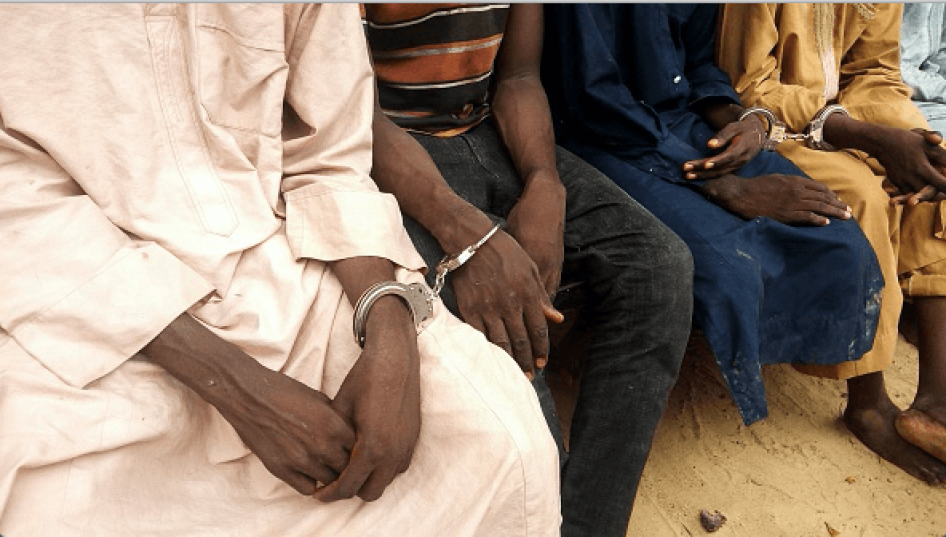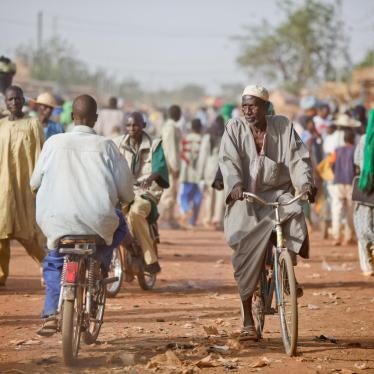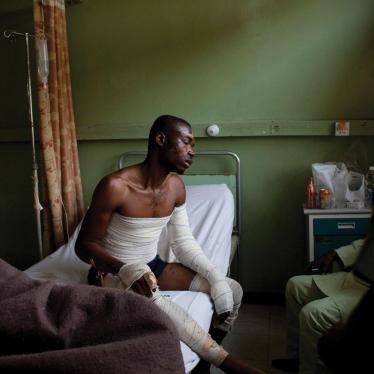(Abuja) – Nigeria’s prosecution of suspected Boko Haram members has been characterized by serious legal shortcomings, and the authorities are failing to prioritize prosecution of those most responsible for the group’s atrocities, Human Rights Watch said today.
In October 2017, authorities began trials of Boko Haram suspects, some of whom have been detained since the conflict began in 2009. Most of the 1,669 suspects prosecuted so far were charged with providing material and non-violent support to the group. People and communities victimized by its brutal attacks have been excluded from observing or testifying in the legal proceedings.
“Nigeria needs to pursue justice for those responsible for Boko Haram’s atrocities and end the prolonged detention of thousands of suspects,” said Anietie Ewang, Nigeria researcher at Human Rights Watch. “However, to achieve justice and deter extremist attacks, the Nigerian government’s overall strategy and trial procedures need to conform with constitutional safeguards and international standards.”
The first round of trials, in October 2017, involved 575 defendants and was shrouded in secrecy, drawing concerns about fair trial and due process issues from several rights groups, including the Office of the UN High Commissioner for Human Rights. Subsequent rounds in February and July 2018 at Wawa Cantonment, a remote military base in Kainji, Niger State, were open to a few monitors from nongovernmental groups and some media personnel.
In the third round, which Human Rights Watch monitored on July 9 and 10, over 200 defendants, including three women, were tried for offenses under the Terrorism Prevention Amendment Act of 2013. Three judges of the Federal High Court presided over the trials in small makeshift courtrooms on the military base where the suspects had been detained. The courts convicted 113 defendants, acquitted 5, and discharged 97 without trial based on the court’s determination that they had no case. Nine cases were struck out due to errors, some of which caused defendants who had been tried and convicted or discharged in previous rounds to be inadvertently brought to trial again, and nine more were adjourned for further trial in Abuja.
In 7 of about 60 cases Human Rights Watch monitored, Federal Justice Ministry prosecutors brought charges for murder, kidnapping, and other crimes, including during gruesome attacks in Damaturu, Bama, and Baga in 2015, and the abduction of 276 schoolgirls in Chibok in April 2014. But most defendants were prosecuted solely for providing “material and non-violent support” to Boko Haram, including by repairing their vehicles, laundering their clothes, or supplying them with food and other items.
The proceedings were very short, with some lasting less than 15 minutes, raising several fair trial and due process concerns. Most charges were couched in ambiguous and vague terms without the crucial information Nigerian law requires, like the specific date, place, and details of the alleged offense. Other procedural lapses included a lack of official interpreters and the use of untrained unofficial interpreters; reliance on alleged confessions; charging previously discharged defendants again for the same offenses; and unclear orders for rehabilitation for some defendants whose releases were ordered. All had public defenders, and some defendants told Human Rights Watch that they had not been able to consult with their lawyers until the day of trial.
A 28-year-old woman charged with concealing information, providing support, and knowingly aiding and abetting the kidnap of children by Boko Haram told Human Rights Watch that she had not been allowed to contact any member of her family to prepare a defense since she was arrested in Kaduna in 2013. She was found guilty and sentenced to time already spent in detention.
Some suspects were tried individually, but others were tried in groups, in some cases without consideration of whether they had been coerced into committing the offense for which they were being tried or had done it simply to survive. The volume of defendants in the “material support” category made it difficult to focus available resources on prosecuting those charged with more serious offenses, a few of whose cases were deferred for further trial in Abuja.
In one case, a defendant accused of failing to provide information to the authorities regarding the activities of Boko Haram mechanics told the court after pleading guilty that he could not report because his community was under the control of Boko Haram, and there was no way to access the authorities. Human Rights Watch previously documented forced recruitment of students, teachers, and others at the peak of the Boko Haram insurgency.
Although the courts discharged 97 defendants and acquitted five more in the July trials, there are fears that they might not have been released. Several people ordered released in the previous trial rounds were arraigned for the same charges in July, apparently inadvertently.
On July 25, Human Rights Watch sent its findings to the justice ministry; the Legal Aid Council of Nigeria, a government-funded public defense agency; and the National Human Rights Commission, seeking a response to questions and concerns about the fair trial and due process irregularities observed. Human Rights Watch also inquired about the time and opportunities for the defendants to build their defense and the failure to release people acquitted or discharged in previous rounds of the trials.
In its response, the Legal Aid Council said its lawyers had met with all the defendants before and during the trials. The agency asserted that participation in a deradicalization program aimed at deterring individuals from violent extremism was compulsory for all defendants, and that their fate after the trials was the responsibility of the attorney general and national security adviser. In what appears to be a contradiction, the Federal Justice Ministry told Human Rights Watch the ministry’s role was strictly prosecutorial, and it had no information on the release or rehabilitation of defendants.
The National Human Rights Commission, which also monitored the trials, said in its response that it shared Human Rights Watch’s concerns about thelack of official interpreters, defective charges, inadequate defense, and reliance on confessional statements at the trials.
In March, the National Human Rights Commission called on the federal government to ensure the immediate removal from military detention facilities of 475 Boko Haram suspects, who were discharged due to lack of sufficient evidence to bring charges against them in the second round of trials in February
In 2017, the federal government adopted a Policy Framework and National Action Plan for Preventing and Countering Violent Extremism, which highlights access to justice, human rights, the rule of law, and community engagement to prevent and counter Boko Haram extremism. However, there was little sign of this being applied in the recent trials, Human Rights Watch said.
The International Criminal Court prosecutor will continue the preliminary examination of the situation in Nigeria, including for crimes committed in the Boko Haram conflict. The examination includes a focus on whether national prosecutions are genuine.
The government should make improving trial procedures a priority. It should also consider creating truth commissions or other community reconciliation efforts for those accused of lesser, non-violent crimes so that the justice system can focus first on those accused of the worst crimes. Similar approaches have achieved a measure of success in other countries, including Timor-Leste.
Nigeria is among a number of countries, including Iraq and Egypt, in which trials for terrorism suspects raise due process concerns. The Nigerian trials are taking place amid increased international support for the country’s counterterrorism efforts. In 2017, the United States approved the sale of US$593 million worth of military equipment to Nigeria, including 12 A-29 Super Tucano light-attack aircrafts the Obama administration had delayed because of human rights concerns. The United Kingdom recently renewed a defense pact with Nigeria, while the United Nations pledged continued assistance in areas including support for criminal justice processes that comply with human rights and rule of law.
“The UN and donor countries should focus not just on boosting military might, but also on ensuring genuine justice and accountability in the campaign against Boko Haram,” Ewang said. “Trials that abuse suspects’ rights are not only unlawful; they can backfire by alienating local communities and handing a recruitment card to groups like Boko Haram.”
Lack of Interpreters
The courts did not provide official Hausa and Kanuri interpreters for the proceedings, although the majority of the defendants in the cases observed only understood one of those languages. Ad hoc arrangements using people at the trial who could speak the languages appeared to be inadequate. In one of the courts, a justice ministry prosecutor was co-opted as the court’s interpreter in Hausa, while a soldier interpreted in Kanuri.
In one case, an observer who spoke the language brought glaring errors in a co-opted interpreter’s translation to the judge’s attention, after which the judge changed the interpreter. Furthermore, the conflicting roles of soldiers and prosecutors acting as interpreters violates fair trial standards.
Lack of Adequate Legal Defense
The proceedings also raised concerns about whether the defendants and their legal representatives had adequate time and opportunity to present their cases. All defendants were represented by court-appointed public defenders from the government-funded Legal Aid Council. The lawyers did not present evidence or call any witnesses other than the defendants. In many cases, the lawyers appeared unprepared and unfamiliar with the case materials. Some defendants told Human Rights Watch that they had not been in contact with any lawyers, family, or community members since the day of their arrest.
A 32-year-old defendant told Human Rights Watch he had no access to a lawyer from his arrest near Abuja in 2015 until the trials began.
Joy Bob-Manuel, the director general of the Legal Aid Council, said in her letter the defense team interviewed the defendants at the military base in October 2017 and thereafter on the day of trial to refresh their recollection of the cases. She said the lawyers did not investigate the defendants’ claims because it is not the agency’s duty to conduct another investigation beyond that carried out by the security agencies.
The 1999 Nigerian Constitution guarantees the right of defendants to adequate time and facilities to prepare for defense in line with the Principles and Guidelines on the Right to a Fair Trial and Legal Assistance in Africa.
Lack of Prosecutable Evidence; Use of Confessions
All the convictions at the trials Human Rights Watch monitored were based solely on confessions. The prosecution did not present any other substantial material evidence or witnesses. There was no testimony from victims or witnesses, except from investigating police officers who secured the confessions.
The officers’ claims that they observed due process safeguards, including for writing confessions, are inadequate to allay concerns about torture, duress, and threats. Human Rights Watch has documented torture and other cruel, inhuman, and degrading treatment by Nigerian law enforcement agencies, and found such treatment to be widespread and routine. The Nigerian Military has also been reported to use torture, starvation, and other brutal abuses in the war against Boko Haram.
In one case, a defendant pleaded not guilty in the Chibok case. But after a brief interrogation, the judge convicted and sentenced him to 20 years in prison based solely on a confession, without inquiring into the circumstances under which it was made.
The justice ministry said in its letter that its staff accompanied the investigating police officers during interrogation to ensure due process in obtaining confessions. The Legal Aid Council also said it asked the defendants about the circumstances and analyzed the statements to ensure they complied with the law on proof of evidence and the administration of criminal justice.
The Principles and Guidelines on the Right to a Fair Trial and Legal Assistance in Africa affirms the right of an accused person against being compelled to confess guilt. It states that confessions or other evidence obtained by any form of coercion should not be admitted as evidence or considered as proof of any fact at trial or in sentencing.
Orders for Rehabilitation
In this round of trials, the courts acquitted 5 defendants and discharged 97 without trial, based on the prosecution’s admission or the court’s determination that there was no evidence to support their trial. The judges ordered some of the discharged defendants to undergo rehabilitation programs to facilitate their reintegration into society. But the judges provided no details about what rehabilitation should entail and did not explain the criteria for releasing people unconditionally.
In one case, the judge ruled that charges of receiving and possessing articles supporting acts of terrorism and jihad should be dropped for lack of evidence. The judge then vaguely ordered the release of the defendant with “rehabilitation and assistance from government,” although he had already spent four years in detention.
Double Jeopardy
Some defendants had already been tried and sentenced or discharged by the court in previous rounds of trials. In at least two instances, a defense lawyer objected to the proceedings on those grounds, saying in one case that a defendant had already been sentenced to three years in prison on the same charges and that the other had been ordered to be discharged during the trials in February.
Although the new charges were immediately dropped, it was an indication that the courts’ orders had not been carried out five months after they were issued.
In March, the National Human Rights Commission said the federal government should ensure the immediate removal from military detention facilities of 475 Boko Haram suspects who were discharged in the second round of trials in February. But the justice ministry and the Legal Aid Council both told Human Rights Watch that the issue was outside their jurisdiction.









